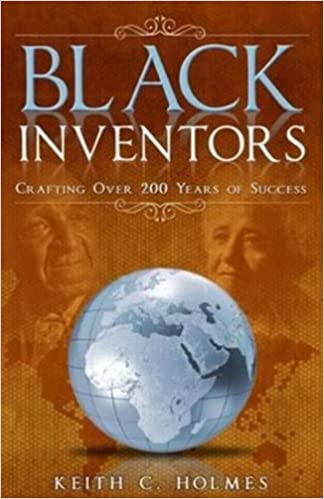
Black Inventors, Crafting Over 200 Years of Success Paperback
New, important book on Black Inventors is an eye-opener Black Inventors - Crafting Over 200 Years of Success by Keith C. Holmes; Paperback: 179 pages - Publisher: Global Black Inventor Research Projects, Inc.; 1st Edition edition) ISBN-10: 0979957303 -ISBN-13: 978-0979957307 Available at Amazon. com and major bookshops By Giorgio Migliavacca It is not widely known in the Virgin Islands that during the 1970s- 80s and 90s, Liston Abbott, of St. Thomas USVI, was instrumental in inventing solutions that improved television signal capacity. But it is quite ironic that Caribbean inventors have had so little recognition from their own countrymen. People from the Caribbean have had a major impact on the world of innovation and invention...More recognition should be given to Caribbean people who have enlightened the world with their innovations and inventions, writes Keith Holmes, author of the recently published book Black Inventors . In fact, his book has brought to day-light information that substantiates his statement: Caribbean inventors have filed patents for a significant number of inventions...and have received world recognition and awards. Holmes lists Caribbean inventors as early as 1769, from most countries in the region including Antigua, Bahamas, Barbados, Bermuda, Cuba, Santo Domingo, Guadeloupe, Haiti, Jamaica, Puerto Rico, Martinique, USVI, St. Vincent and Trinidad and Tobago. The author has spent almost 20 years to piece together information on black inventors. His work will undoubtedly increase readers awareness that on a global scale black inventors, both past and present, have contributed in large measure to the progress made by humanity. This book documents a large number of inventions, patents and labor saving devices conceived by black inventors. Africans, before the era of their enslavement, developed agricultural tools, building materials, medicinal herbs, cloth, and weapons, among many other inventions. Though many black people were brought to the United States, the Caribbean, Central and South America as slaves, it is not widely known that thousands of them created saving devices and inventions that spawned companies which generated money and jobs, worldwide. This book is divided in three main parts: the first explores the role played by ancient African inventors; the second part focuses on native African inventors; and part three delves into black inventors by geographical location, worldwide. The material available in this book is an introduction into the world of inventions by Black inventors. It gives the reader, researcher, librarian, student and teachers the materials needed to effectively understand that the Black inventor is not one dimensional but global occurrence. This book has certainly provided an invaluable tool for those who want to research this fascinating and fertile area of world history. His book proves that without the inventors, innovators, designers and laborers of African descent, in Africa as well as throughout the African Diaspora, western technology, as we know it today, would not exist. There are many significant facts to be learned from Holmes book, for example: the invention process did not originate in Europe; from 1900 to 1999, black inventors patented over 6,000 inventions (at least 400 of them by black women), and between 2000 and 2007, blacks patented over 5,000 inventions; nowadays American icons such as Oprah Winfrey has 61 trademarks; and a significant number of black inventors live in Europe where they have patented thousands of inventions. This fascinating book ends with a very useful bibliography and a detailed and useful index. There are not many distractions and illustrations in this facts-packed volume and we can envision a second, a third edition in a matter of a few years... A must have ! -,12/13/2008. --Island Sun Newspaper, British Virgin Island --Island Sun Newspaper, British Virgin Island
Two of the prolonged myths about Africa is that her history is limited to the continent s colonial past and secondly African s have contributed little to the development of the world s science, technology and agricultural innovations. And even the few publications which do mention Black inventors rarely cite inventors outside the US. Keith Holmes sets out to counter these omissions and in doing so, he provides us with a comprehensive catalogue of Black inventions and inventors as well as a glimpse into the socioeconomic and political history of Black people. Black Inventors: Crafting Over 200 Years of Success. Keith C Holmes. Two of the prolonged myths about Africa is that her history is limited to the continent s colonial past and secondly African s have contributed little to the development of the world s science, technology and agricultural innovations. And even the few publications which do mention Black inventors rarely cite inventors outside the US. Keith Holmes sets out to counter these omissions and in doing so, he provides us with a comprehensive catalogue of Black inventions and inventors as well as a glimpse into the socioeconomic and political history of Black people. This book will prove that without the inventors, innovators, designers and labourers of African descent, in Africa as well as throughout the African Diaspora, western technology, as we know it today, would not exist. Holmes s book is some 20 years in the making and builds on a book by Henry E. Baker written in 1913, The Colored Inventor . Acknowledging Africa as the ancestral homeland of all Black people, Holmes wanted to expand Baker s research which was limited to the US, to include the Motherland and the whole of the African Diaspora. It is not surprising that the book has taken such a long time to write as it includes inventors from Europe, Latin America, the Caribbean, Russia, Australia, Native America as well as the United States over a two hundred year period. The Introduction states the book is organised into three parts. Part One covers the role African civilisations have played in developing innovations. Part Two, identifies inventors who originated in Africa and Part Three provides a geographical breakdown of inventors. I can t understand why the author chose this format as Part One is only 4 pages of, mainly tables covering inventions in Ancient Egypt and pre-colonial Africa. It would have been far better if Part One had been written in a discussion format using the tables to supplement the text rather than the other way around. In Part Two, the author chooses another format which is essentially a series of sentences and although the information is interesting, it seems to me that it would be far more engaging and reader friendly if it was written in a more traditional style of paragraphs built around themes. Sometimes the mixture of writing styles makes the book appear disjointed and scattered which is a shame as it does contain very valuable and previously unpublished material on the history of Africa and her descendents. Part Three is the meat of the book, where we really come to see the value of the content. This is where the author sets out the detailed material invention, country, gender, of hundreds of inventions. He has gone to great lengths to present the data in easy to read table format supported by text, under a range of categories. We are able to see at glance the date of an invention plus the number of inventions by Africans in the various European countries or by women across the various states of the US. We are able to see how our environment shapes the inventions we create. For example a Black Australian is given a patent for the improvement of sheep sheers. An Ethiopian for adapting the typewriter to the Ethiopian script. For the entire article go to pamabazuka.org. --Pamabazuka News - Website Book Review 10-17-2008 --Pamabazuka News - Website Book Review 10-17-2008




